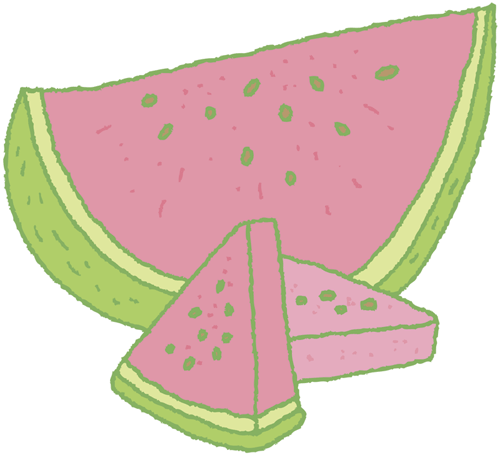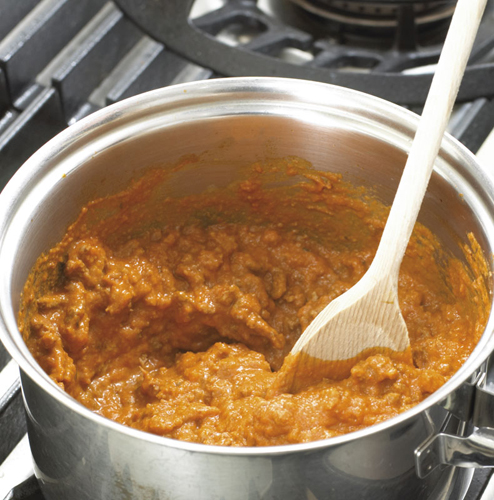|
You’ll be amazed by what your baby will eat. Introduce your little one to new textures and tastes as early and as often as you can to establish healthy and diverse eating habits that he will carry with him into childhood and adult life.

| Q: |
Will exotic fruits be too sophisticated for my baby’s tastebuds?
| | A: |
Because most of us were not introduced to exotic foods in
childhood, we tend to think of them as being “adult food.” However, this
is simply not the case. When they are properly ripened, exotic fruits
are delicious, easy to digest, and full of all the vitamins and minerals
your baby needs. We often underestimate what babies are prepared to
eat. They enjoy unusual tastes, and will explore anything that is
offered to them in the early days.
I highly recommend
putting exotic fruits, such as papaya, melon, mango, kiwi, and passion
fruit, firmly on the menu. See my purée recipe of Banana and Mango or Peach.
If you have an unripe
exotic fruit, pop it in a bag with a banana; its enzymes will encourage
ripening. Or, leave it on your windowsill to let the sun work its magic.
|
| Q: |
Should I give my baby only fruits that are in season?
| | A: |
Most exotic fruits are incredibly sweet and tasty when they are
ripe and in season; however, if you get them when they are out of
season, they can be a huge disappointment. For this reason it’s worth
eating seasonal, locally grown fruits—they will be tastier, sweeter,
more nutritious, and usually less tart than those that have been flown
in from other climates, and therefore you baby is more likely to enjoy
them.
|
| Q: |
How can I make exotic and other fruits into a treat for my baby?
| | A: |
There is something to be said for creating a little bit of good
press, and playing up the virtues of new foods. If you present a
beautifully cut mango with a sprig of mint and some cherries to make it
look like a hedgehog, you have created the ideal treat for your baby. If
you explain that you are so lucky to have found some figs, passion
fruit, papaya, cherries, or kiwi, and then serve them with a flourish,
your little one (and your other children) will be much more impressed.
|
| Q: |
My husband likes to give our little one a taste of what he’s
eating, including Chinese food and curries. She seems to like it—but is
it OK?
| | A: |
Children are much more adventurous with food than grown-ups often
give them credit for. My daughter loved olives at the age of 18 months
and when I planned the menu for a chain of nurseries, we found that the
children’s favorite dish on the menu was chicken curry. There are many
styles of cooking from around the world that appeal to children and it’s
easy to make your own versions of healthy mild curries, stir fries,
pasta dishes, and enchiladas, for example. What’s more, they provide
fantastic opportunities to sneak more vegetables into your baby’s diet.
If you’re eating out,
just little tastes are best at the outset. Look out for whole nuts,
which you should avoid serving until your baby is five. Lots of sugar,
salt, and MSG (an additive that is commonly used in Chinese and other
foods) should also be avoided. Unless there are any particular allergy
concerns, you can enjoy introducing your little one to different tastes
and cuisines. Stick to foods using ingredients you recognize, and if you
aren’t sure about what might be included, ask the chef.
|
| Q: |
Strong flavors and spicy foods seem to appeal to my baby. Will they harm his digestion?
| | A: |
If your baby likes the flavors, and he has no reactions after
eating them, then you can happily introduce whatever spices and herbs
appeal. In other countries, babies are brought up on very strong, spicy
curries and other foods, and cope very well. Indeed, there are
properties in many spices that may help to prevent diarrhea, and
encourage the health of your baby’s stomach.
It’s important to avoid
salt in spicy food, but an adventurous nine-month-old most certainly
should enjoy foods with strong flavors and a hint of spice without any
problem. See my Chicken and apricot curry
recipe, which contains just a hint of spice to tempt your little one.
This can be adapted for the whole family—just add as much spice as you
can handle to the rest of the curry.
|
Did you know…
that you can add
wine, which offers a rich, lovely flavor, to many of the dishes you
prepare for your baby? What you must do, however, is ensure that it is
sufficiently boiled (or even simmered) for at least 10 minutes, as this
causes the alcohol content to evaporate and the flavor to remain. For
example, chicken and fish can be poached in wine, and tougher cuts of
meat, used in stews and casseroles, can be slow-cooked in wine to
tenderize and provide flavor.

Banana and Mango or Peach
Exotic fruits such as mango, peach, papaya, melon, and kiwi are perfect baby foods and they don’t need any cooking. Introduce them by mixing with banana. For older babies, a wedge of peeled mango, melon, or kiwi fruit will make good finger foods. All of these fruits are very nutritious.

3 minutes
Peel the banana and mango or peach .
Mash the fruits together until quite smooth. (This purée is not suitable for freezing.)
Chicken and Apricot Curry
While a very hot curry may not hit the spot for babies, a mild and creamy one is often popular. This recipe is a good way to tempt your baby to try more exciting foods from an early age.
10 minutes
30 minutes
1 tsp sunflower or olive oil 1 small shallot, minced 2 tsp korma or mild curry paste (or to taste) 1 cup canned coconut milk 4 moist dried apricots, chopped 1 skinless, boneless chicken breast, or 2 skinless, boneless chicken thighs, cut into small cubes For serving
Heat the oil in a saucepan
and sauté the shallot very gently for 1 minute to soften. Add the curry
paste and cook gently for 30 seconds, stirring. Stir in the coconut milk
and apricots. Bring to a boil, then reduce the heat and simmer until
the apricots start to soften, about 5 minutes.
Add the chicken and
stir well, then partially cover and simmer, stirring occasionally, until
the chicken and apricots are both tender and the sauce is reduced and
thick, about 20 minutes.
The curry is quite soft
and so is “gummable,” but you can mash or purée it to your baby’s
preferred consistency. Let cool slightly and serve warm, with rice or
couscous.
The curry can be
frozen in individual portions; thaw overnight in the refrigerator when
needed. Add 1 tsp water per portion and heat until piping hot in the
microwave or in a saucepan. Cool slightly and check the temperature
before serving.
|